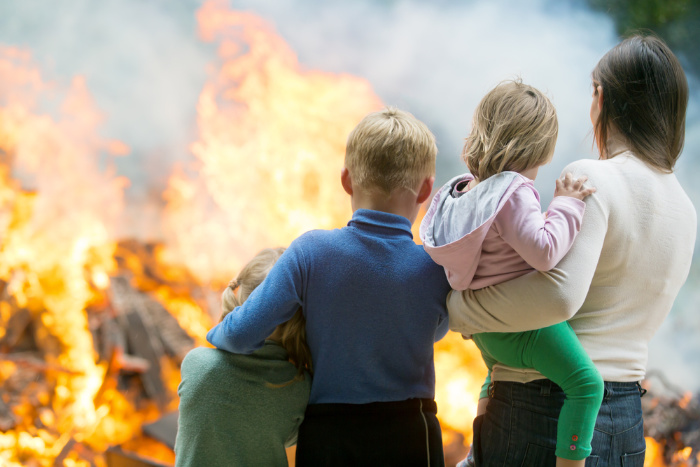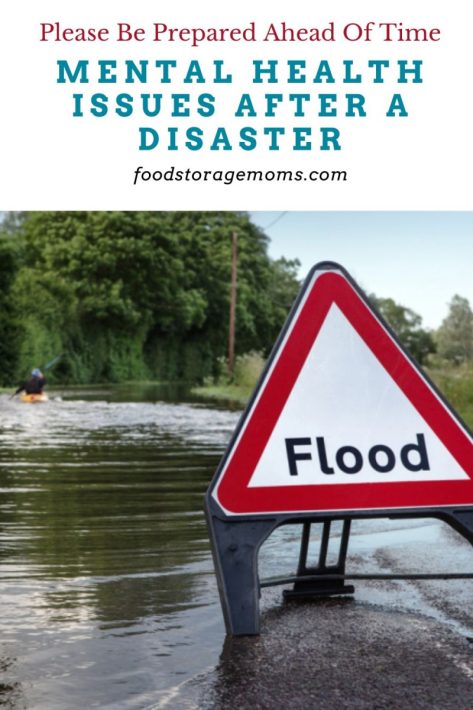
Mark and I took a C.E.R.T. class several years ago that discussed dealing with mental health issues after a disaster. Remember that we are not doctors or involved in any medical field. The initials CERT stand for Community Emergency Respond Team; in other words, first responders in our neighborhood after a disaster.
You can imagine chaos if and when we have a disaster. In an unforeseen emergency, most medical personnel will likely be called to the hospital or medical clinics to treat all the injured. Depending on how bad the disaster is, they may also be called to local schools to care for those who are hurt.

Here’s the deal: we had the most wonderful doctor come and tell us a few tidbits on how to deal with minor mental health issues. I can still picture the woman standing there and talking us through some statements that can help or traumatize people even more. I have outlined the topics we discussed below.
We need to be prepared for those people who live by us with mental health issues who are dependent on their medications. If the pharmacies are closed or the roads are shut down, where can we direct them to get help if help is available?
Emergency Preparedness Meetings
If you have monthly emergency preparedness neighborhood meetings, please suggest that all families consider any medications they take and see if they can get extra inventory by paying cash for the prescriptions. I realize diabetes is a big issue as well, but today, I’m only talking about mental health issues.
For some medications, doctors will not give 90 days’ worth. I understand that, but it doesn’t hurt to ask. I realize some insurance companies will not pay for 90 days, but it’s still worth checking on now before we need those medications. Yes, drugs are expensive, but peace of mind means everything to me.
I have a few friends who pay cash upfront for medications that will last a year so they know for sure they will have the medicines throughout the year and thus any disaster period because they would die without them. It’s surprising how much cheaper prescriptions are if you pay cash over using your insurance. Sometimes, the price is more affordable than the co-pay.
But don’t get me started on that soapbox. Please educate yourself, check around, and see the cash price. You may be shocked at how much cheaper they may be compared to using your insurance plan. Of course, you must get your doctor to agree to prescribe 90 days, 120 days, or 12 months’ worth.
Mental Health Issues
Our CERT team or designated team members:
- Get enough sleep
- Eat a well-balanced diet
- Balance work, play, and get needed rest
- Be ready to receive help as well as give help
- Connect with the people in your neighborhood
- Use spiritual resources
We must use the above tools to help others control their stress levels.
Seven phases after a disaster:
- Introductions and descriptions: we need to show confidence that we know what we’re doing when we talk to the people we work with after a disaster.
- Review the factual material about the incident with the group.
- Share your initial thoughts/feelings about the incident.
- Share your emotional reactions to the incident.
- Review of the symptoms of stress experienced by the participants.
- Instructions about normal stress reactions.
- Closing and further needs assessment.
Provide support by:
- They listen to the people in your neighborhood about their feelings and physical needs. Victims often need to talk about what they have been through and want someone to listen to them. Please don’t just brush them off.
- Empathizingly, your responses should show that you hear their concerns. Victims want to know that someone else shares their pain and grief.
- Help family members connect to natural support systems, such as family, friends, and clergy.
Avoid these phrases:
- “I understand:” We can’t understand unless we have had the same experience.
- “Don’t feel bad:” The survivor has the right to feel bad and will need time to feel differently.
- “You’re strong/You’ll get through this:” Many survivors do not feel strong and question if they will ever recover from the loss.
- “Don’t cry:” It’s okay to cry.
- “It’s God’s will:” Giving religious meaning to an event to someone you don’t know may anger or insult the person.
- “It could be worse” or “At least you still have… ” The individual decides whether things could be worse.
Children At Risk After A Disaster
We need to be prepared to deal with children after a disaster. Yes, it is a mental health issue. They may have anxiety, bad dreams, they may not be able to sleep, fear, they may be grumpy, sad, and angry. Sometimes, children do not know how to express how they feel.
This is why I keep this old TV. It will play DVDs if I use my Goal Zero Solar Generator, and I can also show movies to children and adults. It’s only a 32-inch TV, but it will work great if we stock up on card games, board games, paper, and colored pencils. We will need everything we can pull out of our hat, so to speak, to keep the neighborhood as calm and stress-free as possible.
I must confess I have 10,000 straws ready to serve Kool-Aid or Tang to neighbors. Let’s hope people in my neighborhood can bring their water, right? You know kids love straws, and they are also great for adults. What are some things you have thought about when a calamity hits your neighborhood? I can make dollar pancakes that will surely make someone smile.
Here’s my play dough recipe that you can make: Play Dough by Linda
Names Are Critical
Leanne reminded me about using NAMES when talking to people after disasters. It’s calming to them.
Survivors that need more help:
- If survivors show evidence of being suicidal, psychotic, or unable to care for themselves, they should be referred to mental health professionals for support. (This will be infrequent in most groups of survivors.)
Final Word
After taking this CERT class, it made me aware of statements that are okay and not okay to say to people after a traumatic time in my friends’ lives. If we make a plan about mental health issues before a disaster, we will be more prepared to work through some challenging moments. May God bless those who need to take charge in your neighborhood before the medical, fire department, or emergency personnel show up to take the lead. May God bless this world, Linda
POD or Point of Distribution by Linda
Community Emergency Response Team
Copyright Images: Fire With Woman and Children Looking at House Depositphotos_54994737_S By Bambulla, Flooded Road In Essex Depositphotos_114932078_S By Jayfish
The post Mental Health Issues After A Disaster appeared first on Food Storage Moms.
from Food Storage Moms
No comments:
Post a Comment